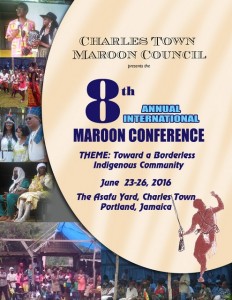The Eighth Annual Charles Town International Maroon Conference: Toward a Borderless Indigenous Community
23 – 26 June 2016
Asafu Yard, Charles Town
Portland, Jamaica
CFP deadline: Abstracts (250-300 words) due by 1 March 2016 to [email protected] (extended deadline)

Call for Papers
Indigenous communities offer models of collective sustainability, territorial sovereignty, ecological justice, and cultural persistence, keenly appealing to a world threatened by environmental rapine and ideological warfare. The Eighth Annual Charles Town International Maroon Conference aims to build a global indigenous community without borders. Legacy of the recently deceased Colonel Frank Lumsden, leader of the Charles Town Maroons, this vision of global unity among geographically distinct yet politically allied indigenous communities advances an alternative to global disaster that combines transnational commonality with cultural specificity and political purpose. This conference solicits papers and participants committed to this vision of cross-cultural engagement, exchange, and creativity, especially work directed toward creating terms of unity among diverse indigenous peoples that might provide models for collective sustainability and persistence for the world at large.
A central focus of this year’s conference will be the experience of indigenous women. Gloria Simms, known also as Gaa’man Mama G, will present a keynote address on the cultural legacy of Nanny, the great Maroon leader. Founder of the Maroon Indigenous Women’s Circle, tireless women’s activist, and bearer of the highest honorific title among Maroons in Jamaica, Mama G recently portrayed Nanny in a documentary film by Roy Anderson entitled Queen Nanny: Legendary Maroon Chieftainess. A screening of the film will follow her address, with its director and producer in attendance.
Taking place in the Asafu Yard, the Charles Town International Maroon Conference explores the issues, values, and practices of Maroons and Indigenous peoples around the globe. It considers the ways these practices and values have endured, transformed, and resonated in the Caribbean, Canada, Australia, South America, Europe, the United States and Africa. Offering a unique combination of scholarly panels and cultural events, it aims bring together descendants of Maroons and Indigenous Peoples with scholars interested in Maroon heritage and indigenous cultures.
Issues to consider might include, but are not at all limited to:
- Indigeneity
- Marronage
- Land Rights
- Geography and Culture
- Language and Literature
- Ethnomusicology
- Cultural heritage economics
- Laws and legality
- DNA
Please send abstracts of 250-300 words by February 15, 2016, or inquiries to [email protected]
Above adapted from emailed announcement.

